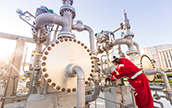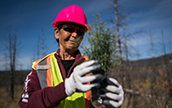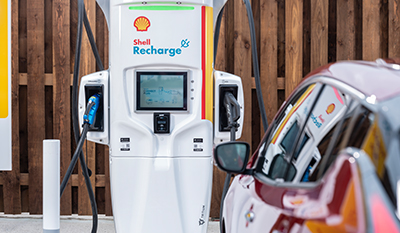Air quality
Powering progress
We are helping to improve air quality by reducing emissions from our operations and providing cleaner ways to power transport and industry.
Cleaner transport options
We are developing a range of lower-emission choices for customers – from electric vehicle charging points to hydrogen – to help people and companies use cleaner modes of transport. For heavy-duty road transport, we offer liquefied natural gas (LNG) as a fuel and gas-to-liquids products, which help reduce sulphur emissions, particulates and nitrogen oxide compared with oil-based products.
Sulphur oxide, nitrogen oxide and volatile organic compound emissions
We follow our own standards and those of local regulators to manage airborne pollutants in our oil and gas production and processing, for example emissions of nitrogen oxides, sulphur oxides and volatile organic compounds.
Our sulphur oxide (SOx) emissions in 2021 decreased to 32 thousand tonnes, compared with 36 thousand tonnes in 2020. This was mainly because of lower emissions from our Shell Energy and Chemicals Park in Singapore as a result of maintenance and permanent shutdown of some units and reduced flaring of acid gas at our Pearl GTL plant in Qatar. This decrease was partly offset by higher SOx emissions at our Scotford upgrader in Canada due to operational issues in the first half of 2021.
Our nitrogen oxide (NOx) emissions decreased from 118 thousand tonnes in 2020 to 105 thousand tonnes in 2021, in part because of fewer ships operated by Shell and lower contractor transport emissions in Nigeria.
Our emissions of volatile organic compounds (VOCs) decreased to 45 thousand tonnes in 2021 from 47 thousand tonnes in 2020. Reductions were in part due to reduced emissions from SMDS (Malaysia), divestments in Canada and the USA, and the fact that Shell no longer operates two facilities in Malaysia. The reductions were partially offset by higher emissions in Nigeria because of increased flaring by Shell Nigeria Exploration and Production Company Limited (SNEPCo) and higher emissions for ships operated by Shell resulting from changes in emission factors for engines.
To find out more about air quality, visit www.shell.com/sustainability/environment/air-quality.
Acid gases and volatile organic compounds
thousand tonnes









